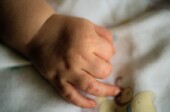- 8 Ways to Increase Dopamine Naturally
- 7 Best Breads for Maintaining Stable Blood Sugar
- Gelatin vs. Collagen: Which is Best for Skin, Nails, and Joints?
- The Long-Term Effects of Daily Turmeric Supplements on Liver Health
- Could Your Grocery Store Meat Be Causing Recurring UTIs?
- Are You Making This Expensive Thermostat Error This Winter?
- Recognizing the Signs of Hypothyroidism
- 10 Strategies to Overcome Insomnia
- Could Artificial Sweeteners Be Aging the Brain Faster?
- Techniques for Soothing Your Nervous System
Epilepsy Drugs in Pregnancy May Affect Infants’ Fine Motor Skills


WEDNESDAY, Sept. 25 Young children exposed to epilepsy drugs in the womb are at increased risk of having impaired fine motor skills, according to a new study. Exposure to the drugs in breast milk, however, does not appear to pose a threat.
Researchers looked at data collected from Norwegian mothers about their children’s language, behavior, and motor and social skills at the ages of 6 months, 18 months and 36 months. The women also provided information on breast-feeding during the first year for the study, which was published online Sept. 23 in the journal JAMA Neurology.
Of the children in the study, 223 were exposed to one or more epilepsy drugs in the womb.
At age 6 months, 11.5 percent of infants whose mothers took epilepsy drugs during pregnancy had impaired fine motor skills (which involve small muscle movements) compared with less than 5 percent of those who were not exposed to epilepsy drugs.
Using more than one type of epilepsy drug during pregnancy was associated with impairments in both fine motor and social skills.
Exposure to epilepsy drugs in breast milk was not associated with any harmful effects for the age groups included, according to a journal news release.
Although the study found that exposure to epilepsy drugs in the womb was associated with a risk for impaired motor skills in infants, it did not prove a cause-and-effect relationship.
“Women with epilepsy should be encouraged to breast-feed their children irrespective of antiepileptic medication use,” said Dr. Gyri Veiby, of the University of Bergen in Norway, and colleagues.
Veiby has received travel support from drugmaker UCB Pharma and lecture fees from GlaxoSmithKline, the study disclosed.
The findings provide additional evidence that it is safe to breast-feed while taking epilepsy drugs, Dr. Paul Van Ness, of the University of Texas Southwestern Medical Center in Dallas, wrote in an accompanying journal editorial.
“Pregnant women with epilepsy often ask whether they will be able to breast-feed,” he said. “Many have been given conflicting advice when there were scant data to answer the question.”
More information
The American Academy of Family Physicians has more about epilepsy and pregnancy.
Source: HealthDay
Copyright © 2026 HealthDay. All rights reserved.










